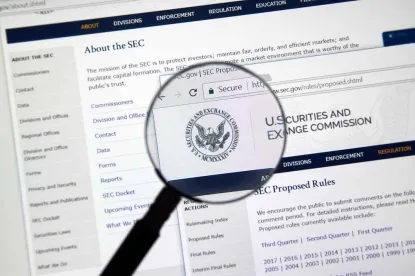There can be no doubt 2021 is already shaping up to be a watershed year, including on the SEC enforcement and securities litigation fronts. Pressure from all directions has been coalescing to drive change in the way companies report information regarding the impact of the pandemic, climate risk, and more generally, environmental, social and governance issues (ESG). It is critical that companies anticipate greater scrutiny regarding their reporting of risks associated with COVID, climate change and ESG, as well as be prepared for enforcement actions and securities litigation that inevitably will follow any perceived deficient disclosure.
The growing interest in more robust ESG disclosure has been accelerated by the unprecedented modern experience of the pandemic, the multiplying effects of climate change and calls for greater sustainability and social justice. The demands for more accurate and consistent disclosures of the material risks associated with ESG factors are coming from varied sources: regulators, shareholders, institutional investors and asset managers, NGOs, and financial institutions worldwide through global initiatives such as the World Economic Forum.1 While it seems unmistakable that some form of regulation and/or standardization of ESG reporting will take hold in the near future, it is also clear that the SEC—and securities litigators—have no intention to wait. The SEC has already begun enforcement efforts based on current regulations, and class actions regarding ESG disclosures have been on the rise.
SEC Enforcement
The SEC made a point of the importance it is placing on accurate disclosures concerning the pandemic when it announced settled charges against The Cheesecake Factory Incorporated in December 2020, and warned it “will continue to scrutinize COVID-related disclosures to ensure that investors receive accurate, timely information."2 Some have called for more guidance from the SEC on required disclosures related to the pandemic’s impact, and others have called for more robust enforcement. Regardless, there is consensus that more aggressive enforcement can be expected under the Biden Administration and the nominated-next Chair of the SEC, Gary Gensler.3
Recent developments confirm that the SEC will be more focused on regulation and enforcement regarding climate risk and ESG. On February 1, 2021, the SEC announced the appointment of its first-ever senior policy advisor for ESG issues. As the Acting Chair of the SEC, Allison Herren Lee, explained, “having a dedicated advisor on these issues will allow us to look broadly at how they intersect with our regulatory framework across our offices and divisions.”4
President Biden has made climate change and ESG issues a priority of his administration, and the decision to rejoin the Paris Agreement, which requires a transition to net-zero carbon emissions by 2050, reinforces that commitment.
Acting Chair Lee has made clear the SEC views climate change not only as an investment risk but also as a systemic risk to financial markets and it intends to make ESG a priority, with an emphasis on “uniform, consistent, and reliable disclosure.”5 Further, Acting Chair Lee recognized that ESG risks are key factors in investment strategies: “[t]he bottom line is that businesses now actively compete for capital based on ESG performance, and that competition needs to be open, fair and transparent.”6 Notably, Acting Chair Lee has made the additional point that not just issuers, but financial institutions should “produce standardized, comparable and reliable disclosure of their exposure to climate risk,” including indirect risk related to “the financing they provide.”7 Funds and their investment advisers are also on the SEC’s radar for ESG disclosures.8
Whether new regulations, industry standards or other ESG metrics are eventually imposed on reporting requirements, it is clear that the SEC will be closely scrutinizing all disclosures to ensure issuers accurately and reliably disclose all ESG-related material risks.
Securities Litigation
Although securities litigation filings showed a dip in 2020, likely due to the decline in M&A activity and pandemic-related court closures, the overall number of new cases was still near record highs with over 334 class actions filed, according to recent Cornerstone Research data.9 Substantial class action activity is expected to continue in 2021 and beyond; it is easier than ever for would-be plaintiffs to connect with plaintiffs’ counsel through the internet and social media. In fact, immediately after the SEC announced the settlement with The Cheesecake Factory, certain law firms had posts on their websites offering to represent shareholders in class actions against the company.
With the focus of the SEC, institutions and the investing public on COVID, climate risk and ESG, companies can expect securities litigation based on these disclosures to increase. This litigation surge will likely be fueled by actions filed following increased SEC enforcement, but it will also be driven by independent shareholder actions. There has already been an increase in the last few years of event-driven litigation, where securities class actions are brought based on the occurrence of an event that negatively affects stock price and company value (e.g., #MeToo movement impacts, environmental events, and cybersecurity breaches). Failure to disclose, failure to adequately disclose, or making misleading disclosures of the events or the risks associated with the events, have been and will continue to be the basis for many of these securities actions.
Regardless of whether consensus can be reached on the standard for ESG disclosures or whether regulations are ultimately imposed, it should be anticipated that the sufficiency of disclosures of material risks related to ESG will be subject to analysis by courts in the context of class actions.10
Conclusion
In order to be prepared for the coming wave of enforcement and litigation, companies and financial institutions should review—and strengthen where appropriate—their policies and procedures to ensure proper COVID, climate risk and ESG-related disclosures. Anticipating the rising expectations of shareholders and regulators is crucial for protecting corporate value in an era of significant social change and market interest. Additionally, issuers need to be prepared to respond to unexpected events, and to be able to do so in real time with sufficient disclosures and appropriate communications to help mitigate enforcement and litigation risk.
Bracewell has a multi-disciplinary team focused on ESG issues. We advise and support our clients drawing on our expertise in environmental strategies, securities matters, regulatory issues, government enforcement, commercial litigation, and crisis management, and we are at the forefront of the transition to sustainable energy. Please contact your Bracewell team member for more information.
_________________________________________________
1http://www3.weforum.org/docs/WEF_IBC_Measuring_Stakeholder_Capitalism_Report_2020.pdf
2 https://www.sec.gov/news/press-release/2020-306;
https://bracewell.com/insights/sec-sends-warning-shot-covid-impact-disclosure
3 As further evidence of the new administration’s pro-enforcement stance, the SEC announced on February 9, 2021 that it restored the ability of the enforcement division's senior officers to “approve the issuance of a Formal Order of Investigation,” which in turn authorizes staff to issue subpoenas and take testimony. https://www.sec.gov/news/public-statement/lee-statement-empowering-enforcement-better-protect-investors
4 https://www.sec.gov/news/press-release/2021-20
5 https://www.sec.gov/news/speech/lee-playing-long-game-110520
6 Id.
7 Id.
8 Id.
9 Annual Report on Securities Class Action Filings, Cornerstone Research and the Stanford Law School Securities Class Action Clearinghouse, released February 3, 2021.
10 All disclosures filed with the SEC are subject to Rule 10b-5, the general anti-fraud provision of the federal securities law, which makes it unlawful to issue materially misleading statements or omissions, or use manipulative and deceptive devices, in connection with the sale or purchase of any security. 17 CFR 240.10b-5.






 />i
/>i

